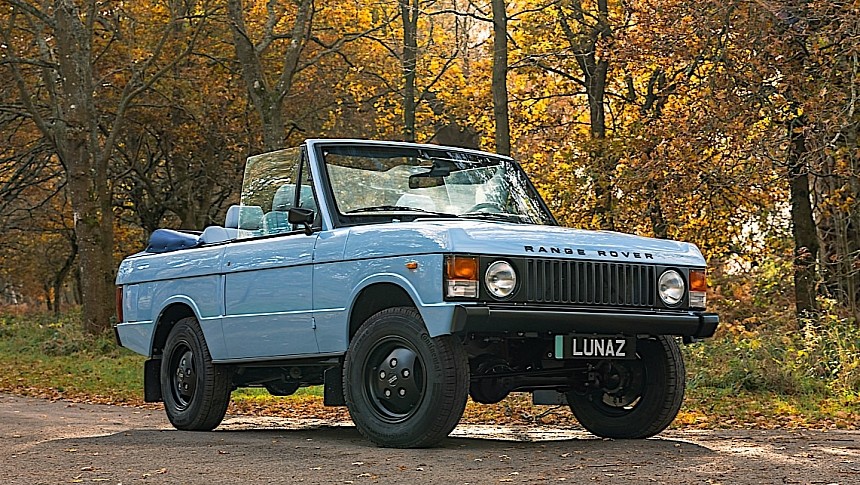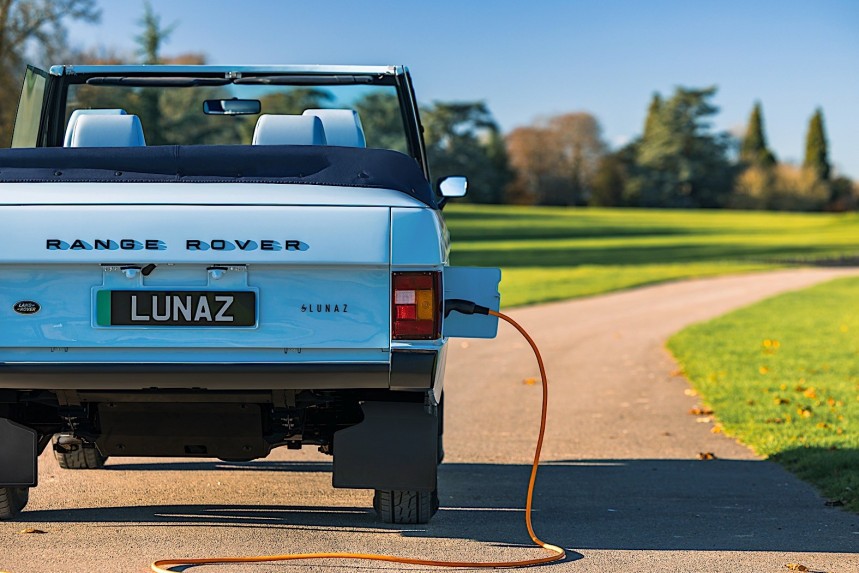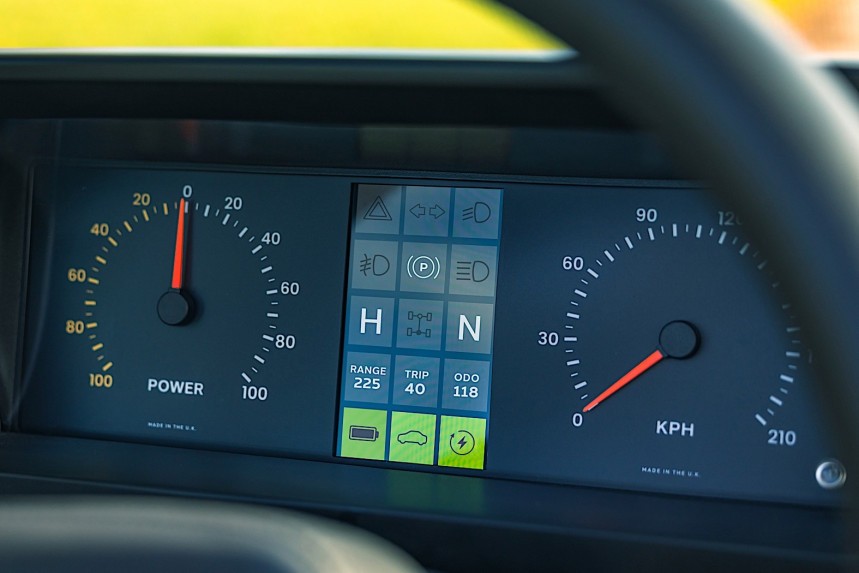If you are not a James Bond fan, I'm not sure you remember a movie called Octopussy. It's a 1983 flick that starred Roger Moore as the famous British spy, and as usual, it is packed full of action, stunts, and unlikely plots to destroy the world or parts of it.
There are several scenes in the movie where a certain Range Rover is seen, used by James Bond to do his thing (check out the video below the text for some of the scenes). It's a peculiar kind of Range Rover, as it does not come in the usual shape, but with no roof, two benches facing each other at the rear, and the unlikely look of an SUV that is at the same time a three-door convertible.
Is it this James Bond Range Rover that has inspired the build we have here. Based on the same short wheelbase 1983 platform as in the movie, it is too roofless and sporting just two doors, it comes across as the ultimate sleeper, with the look and feel of the classic British off-roader but all the power and punch of modern-day fittings.
The project is the work of British company Lunaz, one of the most important on the EV conversion scene. It was put together for an undisclosed customer, and it will likely form the basis of a lot of other incredible electromods coming our way from these guys in the future.
Looked at from the outside, the SUV is unassuming, and judging solely by its one-off Maya Blue paint, you'd be inclined to believe this is some kind of entirely classic jewel used to impress at various shows. But aside from its exterior look, nothing is classic about it.
The most obvious change is the lack of a roof, replaced by a blue mohair convertible top. To support this radical change Lunaz seriously reinforced the body and chassis, and added on top of that new suspension and braking systems. Despite the modifications, the Range Rover retains all the capabilities it had on as it exited the factory, including wading depth (500 mm), approach, breakover and departure angles.
Whereas the exterior of the SUV is 100 percent original, the interior is 100 percent custom. In fact, Lunaz tells us, of the all 5,000 hours that were required for the build of the vehicle, 1,000 were dedicated to the interior alone. That makes it "the most extensive interior development of any car elevated by Lunaz" and something that "is now unrecognizable from the original."
That's because nothing was left to chance, and aside from being new, all the installed features are meant to bring the old Range Rover into the modern era.
It is the dashboard and center console that suffered the most changes, as they needed to be replaced with something that could support an infotainment system. The tech can run both Apple CarPlay and Android Auto, but is also used to display images from the reversing camera and displays a series of digital controls, including for the air conditioning and heating system.
Made in-house by Lunaz (it took two years to build from scratch), the composite center console is 3D printed and finished in Mocca Walnut wood. It's a sight that will come across a lot from now on, as it will be featured from now on on all the classic vehicles the British specialist will convert in the future.
Elsewhere, the seats are naturally covered in leather, but there are also patches of waterproof and chlorine-resistant textile material. From place to place, USB ports have been installed to help with charging devices.
And now, for the powertrain. As you all know, Range Rover used to make its vehicles back then with a V8 engine under the hood. Because this is a Lunaz conversion we're talking about, that powertrain was completely removed, and replaced with something a bit more electrifying.
That would be an electric drivetrain of Lunaz make. The exact specifications of the battery are not disclosed, but if we are to judge by the other products from this crew we've seen recently, we're likely talking about one of about 80 kWh that can get its fill from regenerative braking as well.
We don't know how many electric motors have gone into this thing, but we got word the replacement of the V8 engine comes with an output of 370 horsepower.
The cost of the 1983 Range Rover Safari is not public knowledge, but judging by what else these guys are making, a few hundred thousand dollars is very likely.
The EV it will not be a singular build. Lunaz says it has no less than 50 build slots available for similar conversions. It's unclear how long it will take for one who places an order to get the finished product.
Is it this James Bond Range Rover that has inspired the build we have here. Based on the same short wheelbase 1983 platform as in the movie, it is too roofless and sporting just two doors, it comes across as the ultimate sleeper, with the look and feel of the classic British off-roader but all the power and punch of modern-day fittings.
The project is the work of British company Lunaz, one of the most important on the EV conversion scene. It was put together for an undisclosed customer, and it will likely form the basis of a lot of other incredible electromods coming our way from these guys in the future.
Looked at from the outside, the SUV is unassuming, and judging solely by its one-off Maya Blue paint, you'd be inclined to believe this is some kind of entirely classic jewel used to impress at various shows. But aside from its exterior look, nothing is classic about it.
The most obvious change is the lack of a roof, replaced by a blue mohair convertible top. To support this radical change Lunaz seriously reinforced the body and chassis, and added on top of that new suspension and braking systems. Despite the modifications, the Range Rover retains all the capabilities it had on as it exited the factory, including wading depth (500 mm), approach, breakover and departure angles.
That's because nothing was left to chance, and aside from being new, all the installed features are meant to bring the old Range Rover into the modern era.
It is the dashboard and center console that suffered the most changes, as they needed to be replaced with something that could support an infotainment system. The tech can run both Apple CarPlay and Android Auto, but is also used to display images from the reversing camera and displays a series of digital controls, including for the air conditioning and heating system.
Made in-house by Lunaz (it took two years to build from scratch), the composite center console is 3D printed and finished in Mocca Walnut wood. It's a sight that will come across a lot from now on, as it will be featured from now on on all the classic vehicles the British specialist will convert in the future.
Elsewhere, the seats are naturally covered in leather, but there are also patches of waterproof and chlorine-resistant textile material. From place to place, USB ports have been installed to help with charging devices.
That would be an electric drivetrain of Lunaz make. The exact specifications of the battery are not disclosed, but if we are to judge by the other products from this crew we've seen recently, we're likely talking about one of about 80 kWh that can get its fill from regenerative braking as well.
We don't know how many electric motors have gone into this thing, but we got word the replacement of the V8 engine comes with an output of 370 horsepower.
The cost of the 1983 Range Rover Safari is not public knowledge, but judging by what else these guys are making, a few hundred thousand dollars is very likely.
The EV it will not be a singular build. Lunaz says it has no less than 50 build slots available for similar conversions. It's unclear how long it will take for one who places an order to get the finished product.
















